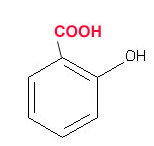Sleep Disorders & Salicylates
Sleep is supposed to be a restful experience, but for Gloria of Austin, Texas, sleep was exhausting. Shortly after falling asleep, her heart would begin to beat irregularly. "I would suddenly awaken and find myself sitting bolt upright, or even standing beside the bed, feeling short of breath and wondering what had hit me."
Gloria began to notice a pattern, with severe sleep attacks occurring after she had eaten tomato sauce, an apple, strawberries, or pineapple (although the canned pineapple is generally well tolerated, fresh pineapple is often a problem for salicylate-sensitive people). Stripping furniture with chemical solvents also caused an attack. Gloria tells her story below:
Basic salicylate structure.
The COOH makes this compound
a salicylate.
The OH (hydroxyl group)
makes it phenolic.Then I began to experience more severe problems. I had been painting the house, and the following morning the right side of my face went numb. I experienced slurred speech, dizziness, blurred vision, and fatigue. I felt like I had been hit in the head with a rubber mallet.
I was also doing decorative painting almost every day with oil based paints. I asked every doctor if this could be a factor. No one knew.
I visited many doctors in search for relief. The drugs I was given brought a host of severe reactions, including a full scale meniere's attack (inner ear problem with loss of balance, dizziness, nausea, etc).
The cardiologist put me in the hospital for a two week stay. Then I was given more drugs, and found to be intolerant of all of them (the sleeping pill was red).
When I left the hospital, I went on a diet recommended by the hospital's nutritionist. It was basically a weight control diet with fruit three time a day.
My attacks became worse than ever. I had difficulty breathing and felt like I was coming apart at the seams. My doctor said I was suffering from anxiety depression. He said the drugs were not causing my problems because "only people who read books have side effects."
I ended up in church next Sunday asking God for a clue. On Tuesday I made an appointment with an allergist because I knew I had attacks after eating.
I no sooner told the allergist I was having a sleep disorder problem when he leaned forward in his chair and said, "I know what's causing it; you have anxiety depression." So-o-o I said, "Let me describe my symptoms."
The allergist told me he didn't deal with food allergies as he had his hands full with pollen (we live in the pollen capital of the world).
But as I was walking out the door he ponderingly said, "Maybe you are intolerant to salicylates in foods." The word struck like an arrow piercing my brain . . . I can still feel the sensation. My first clue. (I later went back and thanked him for that word.)
But at the time I felt like I was at another blind spot in the road. I was in tears by the time I returned home and found my sister on the phone waiting to talk with me.
I told her what I had learned so far and mentioned the foods I had identified as causes. When the conversation, and my crying, had ended, I learned that my niece and her friend were in the next room and heard my phone conversation.
They came into the kitchen and my niece's friend said, "You know you sound as if you have the same problem as the hyperactive children I teach. Some of them can't tolerate salicylates."
Voila! My second clue. SALICYLATES! That wonderful word spoken twice in one hour.
She told me about Dr. Feingold's book, and I was at the bookstore an hour before it opened.
Within three days there were no more irregular heartbeat attacks when I slept. That was August of 1984 and I've been able to see a correlation between the attacks and heavy use of household cleaners, oil based paint, and natural gas.
That explains why I would become so irritable or have an extreme exhaustion spell after cooking a big meal. I have not felt that way since I turned the gas off and began using my electric skillet and microwave oven.
Much love and my thanks to everyone at FAUS.
BACK to Sleep Disorders page
Updated: 2/15/2010
